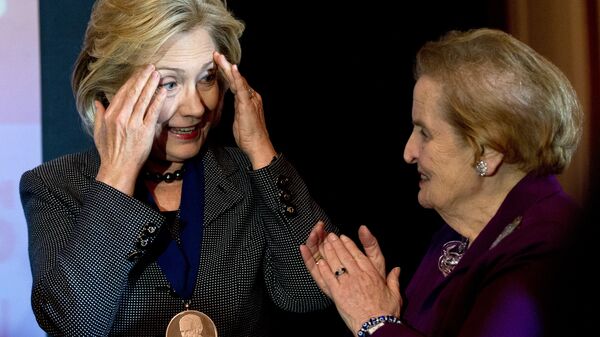The last few weeks have been marked by increasing anti-Russian rhetoric on the part of the US political establishment; the problem is that the irresponsible statements about Russia are made not by marginal politicians but the US foreign policy and defense "professionals," Russian political analyst Dmitry Babich writes in his Op-Ed for RT.
"It has nearly become a common view [in the US political discourse] that Russia poses an 'existential threat' to the United States. Assumptions are being made easily that Russia has illegitimately interfered into the US presidential campaign taking the side of Republican presidential candidate Donald Trump, who is now being demonized by the establishment's subservient media sources. For the first time in several decades serious politicians have focused on the issue of a direct military confrontation between the US and Russia presenting it as a 'realistic' scenario," Babich underscored.
Babich notes that they are using their ties with the Democratic hopeful, Hillary Clinton, to bolster her already tough militaristic position that Russia should be countered by the US both in Europe, Syria and the Far East.
Hillary Clinton has attracted the majority of prominent hawks to her side, including Victoria Nuland and her husband Robert Kagan, who has also joined the anti-Trump neocon campaign.

One of the Clinton camp's most prominent members is Stephen Sestanovich, the former US State Department's ambassador-at-large for the former Soviet Union (from 1997 to 2001), and an expert with the US influential Council on Foreign Relations.
In his latest article for The New York Times, Sestanovich attacked Donald Trump for his remarks on NATO's Article 5 and America's "obligations" before its allies, particularly the Baltic States.
"Consider the case of Latvia. Since the collapse of the Soviet Union, it has managed an uneasy balance between its ethnic Latvian majority and a large Russian minority. Ethnic Russian leaders have pursued political accommodation and supported the country's Western orientation. Ignoring this success, Mr. Trump would give pro-Russian hotheads an opening — an incentive to challenge their moderate rivals, to attract Russian aid and media attention, and to threaten national unity," Sestanovich insisted.
In response to Sestanovich's assumption, Alexey Fenenko, an Associate Professor at the Faculty of World Politics of the Moscow State University, stressed that there is a fundamental flaw in the ex-ambassador's logic.
"After visiting Latvia many times Sestanovich cannot be unaware of the fact that there is no "ethnic peace" there, particularly because of discrimination of the Russian population [in Latvia]. In the past few months this discrimination has been boosted by the US and EU's suspicions that local Russian inhabitants could kick off an uprising in Latvia's Latgale region," Fenenko pointed out, as quoted by Babich.
However, Fenenko remarked, Sestanovich is familiar with the "rules of mainstream," which dictate that right now it is necessary to point the finger of blame at Russia and use it as a "bogeyman" to prevent people dissatisfied with Barack Obama's policies from voting for Donald Trump.
At the same time, Hillary Clinton's "dream team" is beating the war drums over the Syrian conflict, highlighting the necessity to oust Syria's legitimate President, Bashar al-Assad.
In his opinion piece for Consortiumnews.com, American investigative reporter Gareth Porter draws attention to the fact that the Clinton team has dug out the hatchet of war and tries to influence "the course of the war in Syria as well as US policy over the remaining six months of the Obama administration."
"The rationale for doing so is evidently not to strengthen her [Hillary Clinton's] public support at home but to shape the policy decisions made by the Obama administration and the coalition of external supporters of the armed opposition to Assad," Porter notes.
In one of his recent articles for the American Conservative, prominent US political commentator Patrick J. Buchanan pointed out that Trump's astonishing and nearly "treasonous" remarks regarding NATO and its Article 5 have made little if any impression on "Middle America."
"By suggesting the US might not honor its NATO commitment, under Article 5, to fight Russia for Estonia, our foreign policy elites declaimed, Trump has undermined the security architecture that has kept the peace for 65 years. More interesting, however, was the reaction of Middle America. Or, to be more exact, the non-reaction," Buchanan remarked, adding that the American population is tired of perpetual wars which have brought them more harm than good.
As Trump highlighted during his nomination speech, the US roads and bridges are crumbling while more than 43 million Americans are getting food stamps, according to the federal government's data. For comparison's sake the population of Ukraine amounts to 44 million people, according to UN estimates.




